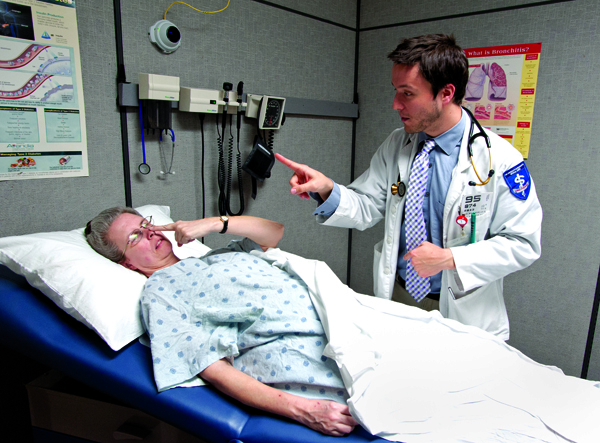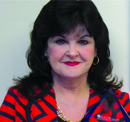BE PATIENT, PLEASE: Students sharpen clinical skills on actors

Published on June 01, 2015
Inside a physical exam room at the Clinical Skills Assessment Center, Dawn Bynum was lying on her back and lying her head off.
The name on her chart, "Mrs. Smith," was as false as the slurred speech she affected to tick off her symptoms for medical student Andrew Bingham: Her face felt funny, (but it didn't); she couldn't sit up easily, (but she could); it was hard to keep her balance, (but it wasn't); and her right leg and arm felt weak, (but they didn't).
Why did Bynum do this? "Because I believe it's helpful," she said later.
It's also her job: As one of UMMC's 70 Standardized Patients, or "patient actors," she's trained to present false complaints that lead students to a medical truth - in this case, probable causes of right-side weakness.
Like any other actor, she learns a standardized script and portrays a character. For certain symptoms, her face may even be painted.
"I feel like I'm doing something worthwhile," Bynum said. "The acting part is also enjoyable. It's like being in a mini-drama."
Standardized Patients, or SPs aren't faculty members and need only a high school diploma to qualify for the job. But they're teaching students some of the most valuable lessons they'll need in their professional careers: How to interview patients, conduct a physical exam, diagnose symptoms, take medical histories, and more.
Administered through the School of Medicine Office of Academic Affairs, the SP program was created originally for third-year medical students to better prepare them for Step 2 of their three-step medical licensing examination: clinical skills.
Students see actual patients as well, but their one-on-one time with SPs offers them the kind of feedback that's rare in the real world of patient care.
Today, the program also reaches some residents and other trainees, including dental students studying oral-maxillofacial surgery, as well as students in nursing, physical therapy, the nurse practitioner program and pharmacy.
"We love working with Dr. Gearhart and her staff," said Dr. Justin Sherman, associate professor of pharmacy practice, whose third-year students' encounters with SPs boost their skills in troubleshooting, counseling, documentation and more.
"They organize everything well and they bring in high-caliber actors."
The actors follow scripts tailored to a student's particular school - pharmacy students might counsel an SP on the proper use of an inhaler, injection techniques or managing medications, for instance.
UMMC students aren't the only ones getting in on the act: Physician assistant students at Mississippi College can take a crack at these patient actors.
Whatever they're studying, students learn what they're good at, and not-so-good at, from the SPs, who even critique each other.

Dr. Judy Gearhart
"It's really important that the students ask appropriate questions," said Dr. Judy Gearhart, recently retired professor and director of the Jackson Medical Mall's Clinical Skills Assessment Center, where the SP exams take place.
"They must be good listeners, instill confidence and show empathy. A patient may not follow your advice if they believe you don't care."
Or, as Bynum put it: Did the student offer to drape you before the exam? Did the student greet you by your name?
"As a patient, I had some doctors who were not very supportive," said Karen Walling, an SP who joined the program at a friend's suggestion.
"To be given the chance to help students learn to build a rapport with their patients, I thought, was a wonderful idea.
"But the reason my friend recommended this is probably because it gives me an outlet for my drama bug."
Like most Standardized Patients, Walling and Bynum live near the assessment center, where no invasive exams are performed. They receive $20 an hour for maybe two or three hours of work, a few times a month, at most. They're not reimbursed for mileage.
Like several other SPs, Walling and Bynum home-school their children and say they can use the extra money SP work provides.
Unlike Walling, Bynum isn't that much into drama.
"I'm not a very emotional person," Bynum said. "When I have to cry or act fearful, I feel much more fake. For a stroke case, all I have to do is lie there.
"But, for me, the hardest part isn't the acting; it's giving the feedback afterward. I don't want to hurt anybody's feelings. But I am trained to give suggestions in a way so the students will not become defensive and tune me out.
"I'd say 98 percent of them are very open to my suggestions and very appreciative of what we're doing."

Brenda Sumrall Smith, Standardized Patient
Dr. Brenda Sumrall Smith signed up as an SP more than 10 years ago, following her semi-retirement from UMMC as director of social work.
A full-time employee for 27 years, she still lectures medical students on how to communicate with, and reassure, patients in sensitive situations - abuse cases, delivering bad news, etc. As an SP, she can show them how.
"Miscommunication and misunderstanding affect whether patients go through treatment," she said.
"A lot of us assume if we give people information in a straightforward way they will remember it, but when you're stressed, your comprehension drops precipitously.
"Breaking bad news is not something people come to naturally; there are certain methods that we teach - body language, facial expressions. It does seem to help."
SPs helped Allison Pace Rogers, who graduated with her M.D. in May. She was, like many medical professionals and trainees, addicted to jargon.
"We have our own language, so I can see why we fall into that," said Rogers, who will do her residency in internal medicine at the University of Alabama-Birmingham.
It's a language that shuns, say, "blood clot" in favor of "thrombosis," a term unfamiliar to many patients, who may also be too self-conscious to ask for a translation.
"The SPs told me I needed to work on that," Rogers said, "which was wonderful. I never got dinged on that again. The program is such a good tool, and the SPs are great.
"I always thought of them as real patients, not as actors. If you approach it that way, you will get better."


